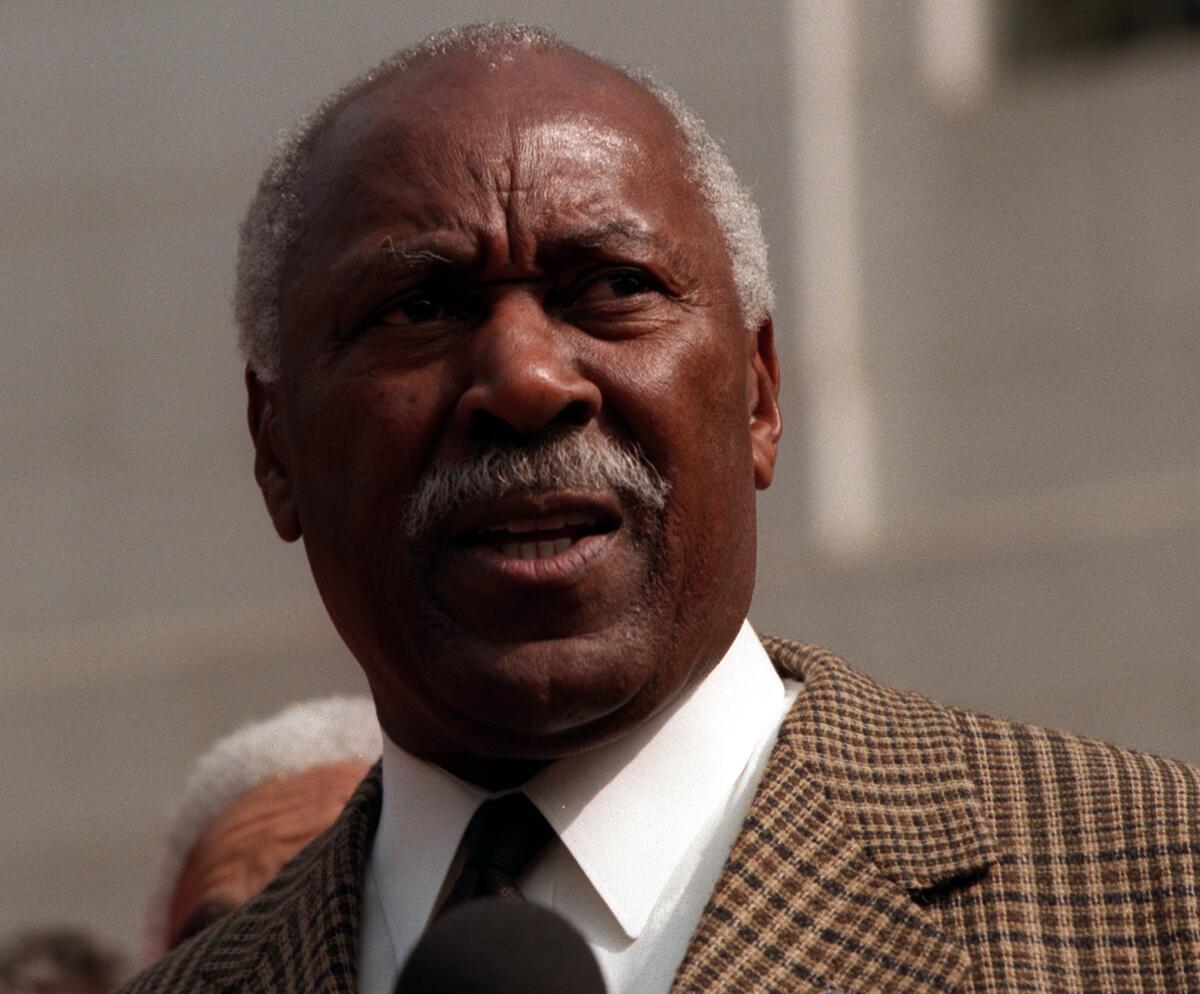Nate Holden, state senator and longtime councilman who fought for South L.A., dies at 95

- Share via
Former Los Angeles City Councilmember Nathaniel “Nate” Holden always spoke with a sense of self-assuredness and a firm belief in his own destiny.
It was the sort of conviction it took for a Black man born in Macon, Ga., in 1929 to ascend to the highest ranks of political power in Los Angeles — representing the region as a state senator and later serving 16 years on the City Council.
A towering figure in L.A.’s political arena, Holden died Wednesday at age 95, his family told L.A. County Supervisor Janice Hahn.
“Nate Holden was a legend here in Los Angeles,” Hahn said in a statement. “He was a lion in the State Senate and a force to be reckoned with on the Los Angeles City Council. I learned a lot sitting next to him in the chambers as a new Councilmember.”
Before launching his political career, Holden served as an aide to Hahn’s father, former L.A. County Supervisor Kenneth Hahn, who relied on Holden for his “unique brand of wisdom.” The younger Hahn said she referred to him as Uncle Nate and considered Holden part of the family.
Holden was a 6-year-old in Georgia when, he said, he heard the state’s governor on the radio vowing to continue his mission to suppress Black people, who at the time were denied the most basic human rights and were frequent targets of angry white mobs.
Herman broke many barriers in her prolific career, and the outpouring of praise since her death suggests how she empowered others to do the same.
He recalled his childhood defiance at the racism that then was on full display in the Deep South. He would throw rocks into the local public swimming pools on the days when only white people were allowed to use them, and once told a white couple while cleaning their backyard that he intended to become president of the United States.
His father was a brakeman for the Central of Georgia rail company, and when his parents separated when he was 10, Nate moved with his mother and brothers to Elizabeth, N.J., where his grandmother lived.
He was a novice boxer at 16, knocking out experienced competitors and local champs at his New Jersey gym. In 1946, he lied about his age and joined the U.S. Army. He was deployed to post-World War II Germany, where he served as a military police officer.
When Holden returned to the U.S., he decided to become a draftsman. But, he said, one of his teachers purposely gave him a bad grade to discourage him, telling him such a job was out of reach for a Black man.
When he applied for a training program for military veterans, he was again denied and told he was wasting his time, that it would never lead to a job.
“I served God and country, I’m gonna get into that training program,” Holden said he told them. “If I don’t get it, I’m gonna go to Washington and knock on that president’s door.”
He was finally admitted and studied design and engineering at night while finishing high school. He eventually worked for several aerospace companies, which led him to California.
Holden made his first foray into politics as a member of the California Democratic Council, a left-leaning reform group. He lost a bid for Congress after campaigning as an opponent of the Vietnam War but also rose to become president of the Democratic reform group.
After being elected to the California Senate in 1974, he helped write the state’s Housing Financial Discrimination Act, which prohibited financial institutions from discriminating based on race, religion, sex or marital status. He also championed legislation to require California’s public schools to commemorate the birthday of Martin Luther King Jr.
Holden left the state Senate after one term to again run for Congress, losing once more. In 1971, he became assistant chief deputy to L.A. County Supervisor Kenneth Hahn, a popular white politician in a heavily Black district.
By the time Holden turned his sights to the Los Angeles City Council in 1987, he had lost six of seven political campaigns over two decades.
“I don’t think I’ve ever lost a race,” Holden told The Times in 1987. “Maybe I wasn’t elected, but I didn’t lose the race. And every time I ran a race, I think the community benefited.”
Holden relished the political fight, often at the expense of his colleagues.
“There’s nothing wrong with competition,” he told The Times in 1987. “It’s like boxing. If you get up in that ring and you’re there by yourself, you’re just shadowboxing. It’s always good to have a contest. There’s nothing wrong with that.”
During Holden’s nearly two-decade tenure on the Los Angeles City Council, he developed a reputation as a lone wolf and as sometimes difficult — abrasive, vindictive and engaging in political grandstanding. He frequently voted against the rest of the council in lopsided votes and openly called his colleagues “stupid,” “phony” and “lazy.”
Then-Councilmember Joan Milke Flores told The Times in 1989 that she once saw Holden mark the name of everybody who went against him on a City Council vote and then approach each person on his list to remind them that he would not forget the vote.
“I’m not running any nursery school,” Holden said. “I ask tough questions of bureaucrats. Hey, politics is a tough business.”
When he was forced off the council by term limits in 2003, Times columnist Patt Morrison said L.A. would be losing “a 16-year franchise on outrageousness, showboating and chutzpah.”
Among constituents, however, Holden was warmly embraced as an opponent of the political establishment and a champion of his community.
Holden represented the predominately Black 10th District and became a spokesperson for the poor and middle class in South Central and southwestern Los Angeles, where neighborhoods struggled with drug and gang violence in the late 1980s. He worked to wrangle funding for increased police foot patrols to reduce crime and foster a more trusting relationship between officers and residents.
He constantly made to-do lists — pothole fixes, tree-trimming, broken streetlights — and peppered city departments with letters and phone calls to get the work rolling. He became legendary among city employees for berating them when things didn’t happen fast enough.
“They used to call me Stop Sign Holden, ’cause I made my district safe for pedestrians,” Holden said. “When something had to be done, I got it done.”
He also pushed for more parks, libraries and recreational centers in his district and was so invested in the neighborhoods that when a performing arts center was built in Mid-City in 2003, it was named in Holden’s honor.
“Nate works harder with his constituents and other residents of Los Angeles than he does at pleasing his colleagues,” then-Councilmember Joy Picus told The Times in 1993. “He has street smarts and is very populist.”
Always looking for a fight, Holden made a pass at the mayoral seat in 1989 against the heavily favored incumbent, Tom Bradley, who had previously represented the 10th District as a council member.
Holden made national news during the campaign when he launched a then-unique gun buyback program, offering $300 from his own campaign war chest to anyone who would surrender an assault rifle.
Holden lost, but his intense campaigning combined with a low voter turnout gave Bradley a run for his money.
“He’s a fighter,” said Herb Wesson, who worked as Holden’s chief of staff during his first term. “If I was ever in a bar fight, I would sure hope that Nate Holden was on the bar stool next to me.”
Holden’s long stint on the City Council was cemented in part by his courtship of Korean American constituents. Although Koreatown residents did not have a large voting bloc, they did have fundraising power, donating a fourth of the campaign contributions Holden received from 1991 to 1994.
In return, Holden helped Korean American business owners acquire liquor permits in L.A., turning the area into one of the city’s hot spots for nightlife after businesses faltered during an economic slump in the early 1990s.
“That’s Nate Holden’s legacy in Koreatown,” Charles Kim, executive director of the Korean American Coalition, told The Times in 2002. “His legacy is a lot of places getting upgraded from beer and wine to full liquor licenses, and extending their hours from midnight to 2 a.m.”
A Times investigative report later revealed that many of the business owners who received liquor licenses had donated to Holden’s campaigns. And some saw duplicity in Holden’s efforts since the councilman had fought so vigorously to restrict liquor licenses in South L.A. after the 1992 riots.
Outside politics, Holden’s tenacity was evident in other ways, such as the L.A. Marathon, which he ran at 61 and again at 62. When he ran for an Assembly seat after his council career ended, he campaigned by marching down streets in the district and stopping every block to do a one-armed push up.
“I used to run every morning in the snow in New Jersey. Cold weather. Before school every morning I ran,” Holden said. “When I came to California, I ran every morning — 5 a.m.”
Holden’s long career, however, was not without blemish. In the 1990s, Holden was hit with three separate sexual harassment allegations from former aides. The women accused him of inappropriate touching, offensive comments and creating a hostile work environment.
Holden fought back aggressively, winning one case in court and settling another. A third claim was dropped. But his legal defense cost the city roughly $1.3 million.
He was also fined repeatedly for violating campaign finance laws, racking up more than 70 violations and $30,000 in fines. Holden acknowledged some of the violations but alleged the city’s ethics commission held him to a higher standard than his colleagues.
Holden retired from the council in 2003 but remained active in the community. At 92, he was still serving on the board of the South Coast Air Quality Management District, a regulatory agency that oversees air quality for much of Los Angeles and the Inland Empire.
Pondering his legacy, Holden said he wanted to be remembered as “a good guy.”
“Doing the best you can for the people. Law and order. Make sure that people’s communities are safe. I did it all,” Holden said.
Holden is survived by sons Reginald Holden, a former Los Angeles County sheriff’s deputy, and Chris Holden, a former member of the California Assembly and former Pasadena mayor, as well as several grandchildren. His wife, Fannie Louise Holden, died in 2013 from complications of Alzheimer’s disease.
Times staff writer Clara Harter contributed to this report.
More to Read
Sign up for Essential California
The most important California stories and recommendations in your inbox every morning.
You may occasionally receive promotional content from the Los Angeles Times.












